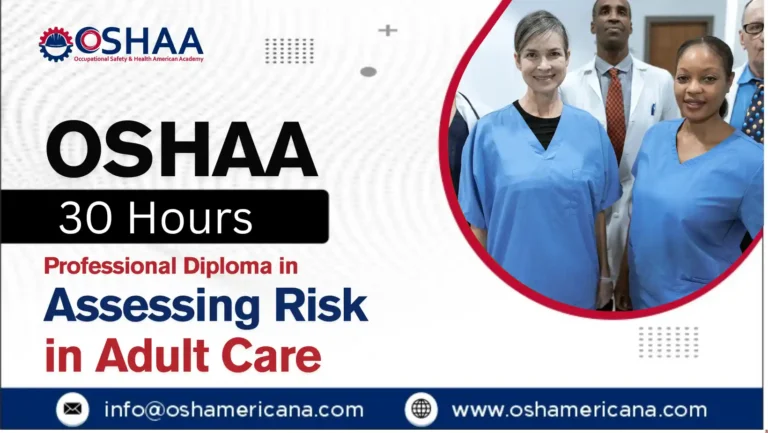Advance your expertise with the OSHAA 30-Hours Applied Behaviour Analysis course. Gain evidence-based skills to improve behaviour, ensure compliance, and support growth.
The OSHAA 30-Hours Applied Behaviour Analysis course is a comprehensive training program designed to equip professionals with the knowledge, tools, and strategies necessary to apply evidence-based behavioural principles in real-world settings. Applied Behaviour Analysis, commonly known as ABA, is a scientifically validated approach that focuses on understanding how behaviour works, how it is influenced by the environment, and how it can be effectively modified. This methodology has been widely recognized for its success in supporting individuals with autism spectrum disorder, as well as addressing a broad range of behavioural challenges across all age groups.
The OSHAA 30-Hours Applied Behaviour Analysis course emphasizes the importance of compliance, safety, and professional development while providing participants with practical skills that can be applied in educational, healthcare, and social service environments. By exploring the foundations of ABA, learners gain a deeper understanding of how to assess behaviour, identify triggers, and implement structured interventions that encourage positive behavioural change. The course highlights the dual focus of ABA: reducing harmful or undesirable behaviours while simultaneously teaching new skills that enhance quality of life and long-term development.
One of the key strengths of the OSHAA 30-Hours Applied Behaviour Analysis course lies in its ability to bridge theory with practice. Participants are introduced to scientifically supported methods that can be applied directly in classrooms, clinical settings, and community programs. This ensures that professionals not only understand the theoretical framework of ABA but also develop the confidence to implement interventions that are ethical, effective, and compliant with safety standards. The course also underscores the importance of data-driven decision-making, enabling learners to track progress, evaluate outcomes, and continuously refine their approaches to achieve measurable results.
The relevance of this training extends beyond individual practice to organizational and institutional benefits. By completing the OSHAA 30-Hours Applied Behaviour Analysis course, professionals contribute to safer, more supportive environments that align with regulatory standards and best practices in behavioural health. Organizations benefit from reduced risks, improved staff performance, and enhanced service delivery, while individuals gain the professional credibility and certification needed to advance their careers in caregiving, education, and healthcare.
Ultimately, the OSHAA 30-Hours Applied Behaviour Analysis course is an invaluable resource for anyone committed to improving behavioural outcomes and fostering positive change. Whether you are a teacher seeking to manage classroom behaviours, a healthcare provider supporting patients with developmental challenges, or a social worker addressing complex behavioural needs, this program equips you with the essential skills to make a meaningful difference. By mastering ABA principles through this structured training, participants are empowered to support individuals in developing essential life skills, achieving greater independence, and leading more fulfilling lives.
The OSHAA 30-Hours Applied Behaviour Analysis course is more than just a certification; it is a professional investment in evidence-based practice, safety compliance, and long-term success. Through its focus on applied learning, regulatory alignment, and professional growth, this program ensures that learners are fully prepared to meet the demands of modern caregiving and behavioural support, making it an essential step for professionals dedicated to excellence in their field.
OSHAA 30-Hours Applied Behaviour Analysis
To enroll in the OSHAA 30-Hours Applied Behaviour Analysis course, learners are expected to meet the following criteria:
- Age Requirement
- Applicants must be at least 18 years of age to register for the OSHAA 30-Hours Applied Behaviour Analysis course. This minimum age requirement ensures that participants have the maturity and responsibility necessary to engage with the sensitive and technical aspects of behavioural science, compliance standards, and professional caregiving practices. Meeting this requirement guarantees that learners are prepared to apply the knowledge gained in real-world educational, healthcare, and social service environments.
- Educational Background
- A high school diploma or equivalent is recommended as the minimum educational qualification for enrollment in the OSHAA 30-Hours Applied Behaviour Analysis course. While this level of education provides sufficient preparation, individuals with higher education in psychology, education, healthcare, or social sciences will find the course particularly advantageous. Advanced academic backgrounds allow learners to integrate ABA principles more effectively, but the program is structured to be accessible to all professionals committed to improving behavioural outcomes and ensuring compliance with safety and regulatory standards.
- Work Experience
- Prior professional experience in caregiving, education, or healthcare is not mandatory to enroll in the OSHAA 30-Hours Applied Behaviour Analysis course. However, individuals currently working as teachers, therapists, social workers, or healthcare providers will benefit from the immediate application of the course content in their daily roles. For those new to the field, the program provides a strong foundation in understanding behavioural assessment, intervention strategies, and compliance with workplace safety standards, making it an excellent entry point into professional practice.
- English Proficiency
- Learners must be able to read, write, and speak English fluently to successfully complete the OSHAA 30-Hours Applied Behaviour Analysis course. Proficiency in English is essential for understanding course materials, engaging with case studies, and applying regulatory requirements in professional practice. Since the course emphasizes evidence-based interventions, compliance with OSHA standards, and the application of behavioural strategies, strong English communication skills ensure that participants can fully comprehend the training and implement best practices effectively in diverse caregiving, educational, and clinical settings.
The eligibility requirements for the OSHAA 30-Hours Applied Behaviour Analysis course are designed to ensure that participants are fully prepared to engage with the program’s comprehensive content and apply its principles in professional contexts. By meeting these criteria, learners can maximize the benefits of this specialized training, strengthen their professional development, and contribute to safer, more effective environments for individuals with behavioural challenges. This makes the OSHAA 30-Hours Applied Behaviour Analysis course an essential step for professionals dedicated to advancing their careers while prioritizing compliance, safety, and high-quality behavioural support.
Study Units
Learning Outcomes
Introduction to Applied Behaviour Analysis (2 Hours)
- Understand the core principles and history of Applied Behaviour Analysis (ABA).
- Recognise the importance of evidence-based practices in modifying behaviour.
- Learn key concepts such as behaviour, environment, reinforcement, and punishment.
- Understand the role of data collection and analysis in ABA.
- Develop awareness of ethical considerations when applying ABA in various settings.
The ABCs of Behaviour: Antecedents, Behaviour, and Consequences (5 Hours)
- Understand the ABC model (Antecedent, Behaviour, Consequence) and how it explains behaviour.
- Identify and analyse the antecedents and consequences that influence specific behaviours.
- Learn how to apply the ABC framework to modify behaviours in different contexts.
- Develop skills to observe and record behaviours using the ABC model.
- Gain practical experience with real-world examples of using the ABCs to understand and manage behaviour.
Behaviour Assessment and Data Collection (6 Hours)
- Learn the process of conducting a Functional Behavioural Assessment (FBA).
- Understand different types of data collection methods such as frequency, duration, and intensity.
- Develop skills in designing and using observation tools for tracking behaviour.
- Learn how to analyse and interpret behavioural data to inform interventions.
- Understand how to use data to monitor progress and adjust interventions as needed.
Positive Reinforcement and Behavioural Interventions (6 Hours)
- Understand the principles of positive reinforcement and its role in increasing desired behaviours.
- Learn how to identify and use effective reinforcers in various situations.
- Develop strategies for using reinforcement schedules to encourage behaviour change.
- Understand the difference between primary and secondary reinforcers and how to apply them.
- Apply reinforcement strategies in case studies and real-life scenarios to demonstrate learning.
Teaching New Skills and Behavioural Modification Techniques (5 Hours)
- Learn techniques for teaching new behaviours through prompting, shaping, and chaining.
- Understand how to break down complex skills into smaller, manageable tasks using task analysis.
- Develop the ability to implement skill acquisition programs based on ABA techniques.
- Gain experience in teaching communication, social, and self-help skills using ABA principles.
- Understand how to modify behaviours through consistent and effective intervention strategies.
Managing Challenging Behaviours (3 Hours)
- Understand the functions of challenging behaviours and how to assess them.
- Learn how to develop Behaviour Intervention Plans (BIPs) to address problematic behaviours.
- Gain practical skills in using ABA techniques such as differential reinforcement and extinction to reduce undesired behaviours.
- Develop strategies for managing behaviours like aggression, self-injury, and non-compliance.
- Learn how to evaluate the success of behaviour management interventions over time.
Ethical Considerations in ABA Practice (3 Hours)
- Understand the ethical standards and professional conduct guidelines for ABA practitioners.
- Learn about the importance of informed consent, confidentiality, and respect for individuals receiving ABA interventions.
- Develop an understanding of how to handle ethical dilemmas in ABA practice.
- Gain knowledge of legal and ethical frameworks governing ABA interventions.
- Apply ethical decision-making principles in case study scenarios.
The OSHAA 30-Hours Applied Behaviour Analysis course offers a wide range of benefits for professionals, organizations, and stakeholders committed to improving behavioural outcomes in educational, healthcare, and social service environments. This program is globally relevant, providing evidence-based strategies that align with international standards of safety, compliance, and professional practice. By focusing on applied learning, regulatory awareness, and professional development, the course equips participants with the tools to create safer, more effective environments while advancing their careers and enhancing organizational performance.
- Comprehensive Knowledge of Behavioural Science
- Participants gain a deep understanding of Applied Behaviour Analysis principles, including how behaviour is influenced by environmental factors and how it can be modified. This knowledge forms the foundation for effective behavioural interventions.
- Regulatory Compliance and Legal Protection
- The OSHAA 30-Hours Applied Behaviour Analysis course emphasizes compliance with OSHA standards and workplace safety regulations. This ensures that professionals and organizations meet legal requirements while reducing liability risks.
- Evidence-Based Intervention Skills
- Learners acquire practical strategies to design and implement interventions that are scientifically validated. These skills allow professionals to address behavioural challenges effectively and ethically.
- Workplace Safety and Risk Reduction
- By applying ABA principles, participants learn to reduce harmful behaviours and create safer environments for both staff and clients. This contributes to fewer incidents and improved workplace safety.
- Professional Development and Career Growth
- Completing the OSHAA 30-Hours Applied Behaviour Analysis course enhances professional credibility and opens opportunities for advancement in education, healthcare, and social services. Certification demonstrates expertise in a high-demand field.
- Improved Communication and Collaboration
- The course strengthens communication skills, enabling professionals to work more effectively with colleagues, families, and clients. Clear communication ensures that behavioural strategies are consistently applied.
- Cost Savings and Operational Efficiency
- Organizations benefit from reduced incidents, improved staff performance, and fewer legal claims. The course contributes to long-term efficiency and cost savings by promoting proactive behavioural management.
- Leadership and Management Skills
- Participants develop leadership capabilities by learning how to guide teams in implementing ABA strategies. This fosters a culture of accountability, compliance, and continuous improvement.
- Enhanced Caregiver and Worker Well-Being
- The OSHAA 30-Hours Applied Behaviour Analysis course emphasizes strategies that reduce stress for caregivers and staff. By managing challenging behaviours effectively, professionals can maintain their own well-being and productivity.
- Emergency Preparedness and Response
- Learners are trained to respond to behavioural crises with confidence and professionalism. This preparedness ensures quick, safe, and compliant responses in high-risk situations.
- Risk Management and Prevention
- The course equips participants with tools to identify potential behavioural risks early and implement preventive strategies. Proactive risk management reduces long-term challenges and improves outcomes.
- Continuous Improvement and Innovation
- The OSHAA 30-Hours Applied Behaviour Analysis course fosters a culture of ongoing learning. Participants are encouraged to adapt to new research, refine their methods, and innovate in their professional practice.
- Global Relevance and Applicability
- The principles taught in this course are recognized worldwide, making the training valuable for professionals seeking international career opportunities. ABA skills are transferable across diverse cultural and professional contexts.
- Enhanced Client and Patient Outcomes
- By applying ABA strategies, professionals help individuals develop essential life skills, improve independence, and achieve better quality of life. This positive impact extends to families and communities.
- Organizational Excellence and Reputation
- Institutions that invest in the OSHAA 30-Hours Applied Behaviour Analysis course demonstrate a commitment to safety, compliance, and high-quality care. This strengthens their reputation and competitive advantage in the industry.
The OSHAA 30-Hours Applied Behaviour Analysis course is more than a training program—it is a professional investment in evidence-based practice, compliance, and long-term success. By completing this course, participants gain advanced knowledge, practical skills, and recognized certification that enhance their careers while ensuring safer, more effective environments for individuals with behavioural challenges. This makes the OSHAA 30-Hours Applied Behaviour Analysis course an essential step for professionals and organizations dedicated to excellence in behavioural support and workplace safety.
The OSHAA 30-Hours Applied Behaviour Analysis course is designed for professionals, organizations, and stakeholders who are committed to improving behavioural outcomes in educational, healthcare, and social service environments. This program is highly relevant for individuals working with children, adults, or patients who require structured behavioural support, as well as for institutions seeking to strengthen compliance with OSHA safety standards and workplace regulations. With global applicability, the OSHAA 30-Hours Applied Behaviour Analysis course provides evidence-based strategies that enhance professional development, ensure regulatory compliance, and improve operational efficiency across diverse caregiving and professional settings.
- Educators and Teachers
- Play a central role in shaping student behaviour and learning outcomes in classrooms.
- The OSHAA 30-Hours Applied Behaviour Analysis course equips them with strategies to manage challenging behaviours effectively.
- Educators gain tools to foster positive learning environments and improve student engagement.
- Training ensures compliance with safety standards while enhancing classroom management efficiency.
- Healthcare Professionals
- Include nurses, therapists, and allied health workers who support patients with behavioural challenges.
- This course provides evidence-based methods to address behavioural issues in clinical and caregiving settings.
- Professionals gain skills in behavioural assessment, intervention, and patient support.
- Certification ensures OSHA compliance and strengthens workplace safety in healthcare environments.
- Social Workers
- Advocate for individuals and families facing behavioural and social challenges.
- The OSHAA 30-Hours Applied Behaviour Analysis course enhances their ability to design and implement effective interventions.
- Participants gain practical tools for counselling, crisis management, and family engagement.
- Training supports compliance with workplace safety standards and improves service delivery.
- Special Education Professionals
- Work with children and adults with developmental disorders, including autism spectrum disorder.
- This course provides specialized strategies for managing complex behavioural needs.
- Learners gain expertise in implementing ABA techniques to support skill development and independence.
- Certification ensures compliance with OSHA standards and strengthens professional credibility.
- Facility Managers and Administrators
- Oversee the operations of schools, clinics, and caregiving institutions.
- The OSHAA 30-Hours Applied Behaviour Analysis course helps them implement safety policies and behavioural management frameworks.
- Administrators gain knowledge of compliance, risk management, and staff training.
- Training improves operational efficiency and reduces organizational liability.
- Human Resource Professionals
- Manage staff training, compliance, and workplace well-being in caregiving and educational organizations.
- This course provides tools to integrate ABA training into workforce development programs.
- HR professionals gain insights into reducing workplace risks and supporting staff resilience.
- Certification ensures OSHA compliance and enhances organizational performance.
- Counselors and Psychologists
- Provide emotional and behavioural support to individuals in schools, clinics, and community programs.
- The OSHAA 30-Hours Applied Behaviour Analysis course strengthens their trauma-informed and behavioural intervention skills.
- Participants learn to apply evidence-based strategies for long-term behavioural improvement.
- Training ensures compliance with safety protocols and enhances professional practice.
- Community and Nonprofit Workers
- Deliver services to vulnerable populations in community-based programs.
- This course equips them with practical tools for behavioural support and crisis management.
- Learners gain strategies to create safe, supportive environments for diverse groups.
- Certification demonstrates compliance with OSHA workplace safety standards.
- Supervisors and Team Leaders
- Manage caregiving or educational teams and oversee daily operations.
- The OSHAA 30-Hours Applied Behaviour Analysis course equips them with leadership skills to enforce safety and behavioural protocols.
- Supervisors learn effective communication and team management strategies.
- Training supports compliance, operational efficiency, and workplace safety.
- International Professionals
- Work in global education, healthcare, and caregiving systems where OSHA standards are recognized.
- The OSHAA 30-Hours Applied Behaviour Analysis course provides universally applicable training in Applied Behaviour Analysis.
- Learners enhance their employability and career mobility across international markets.
- Certification demonstrates global compliance with workplace safety and behavioural standards.
The OSHAA 30-Hours Applied Behaviour Analysis course equips participants across all roles with advanced knowledge, professional skills, and recognized certification to enhance safety, compliance, and operational excellence in their respective industries. By addressing the needs of educators, healthcare providers, social workers, administrators, and community professionals, this program ensures that every participant is prepared to meet OSHA requirements, reduce risks, and apply evidence-based behavioural strategies. The OSHAA 30-Hours Applied Behaviour Analysis course is a globally relevant and career-defining training opportunity for professionals and organizations dedicated to excellence in behavioural support, compliance, and workplace safety.







